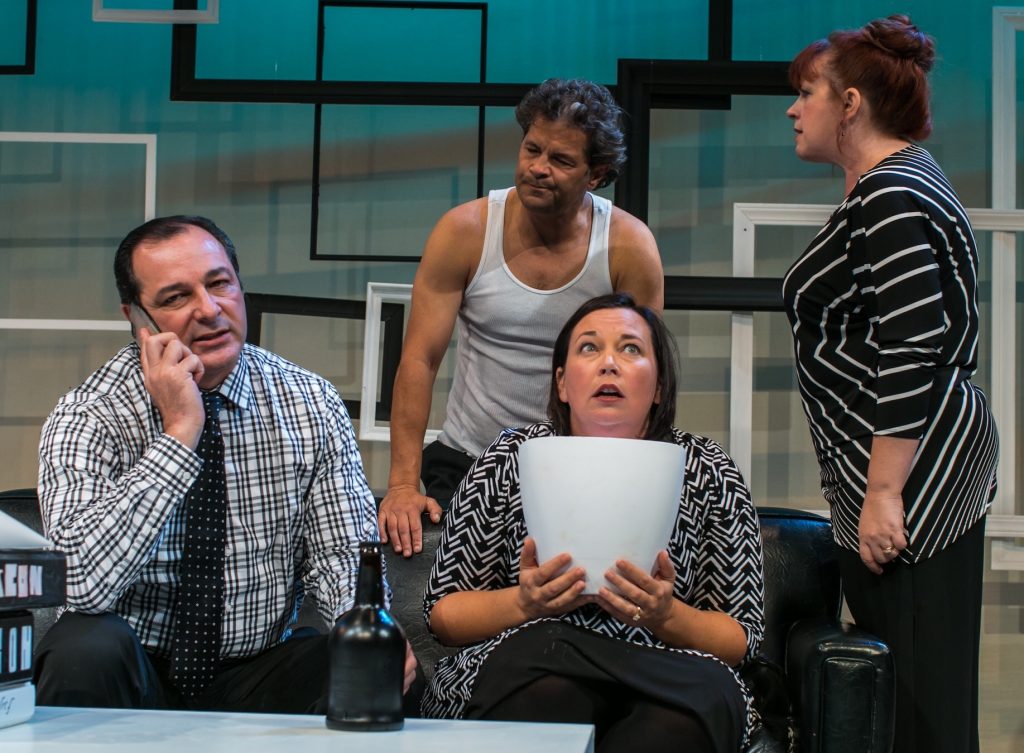Yasmina Reza Is No Albee, But That Doesn’t Stop NVA’s Excellent ‘Carnage’
If playwright Yasmina Reza had written a master’s thesis on the use of comic relief in Who’s Afraid of Virginia Woolf, the result might on the surface look a lot like her God of Carnage. Both plays feature two desperately unhappy couples about to visit their deep-seated hostilities on one another, tripped largely over trifling small talk; the breadwinners are a considerable distance apart in their occupations; and alcohol (gin for Woolf‘s characters, rum for the Carnage staff, thanks) fuels the rough-and-tumble back-and-forth that culminates in the fear and shame only sobriety can bring.
To boot, both shows won Best Play Tony Awards, Woolf in 1963 and Carnage in 2009.
The comparison isn’t original with me by a long shot; and in fact, it applies only to a point (the late Edward Albee’s Woolf, after all, is a shattering dramatic portrayal of lost and broken souls, whereas Carnage relies on situational comedy). But don’t let Reza’s play (translated from her native French by Christopher Hampton) fool you — beneath the bawdy digs and vaudevillian tenor lies a work of immense demand on the actors, not unlike that required for the seminal Woolf.
It’s here that New Village Arts’ Carnage excels, its entertainment value eclipsed only by its powers of illumination.

If looks could kill: Alan Raleigh, Michael Novak, Annette Raleigh and Veronica Novak (from left, Manny Fernandes, Jeffrey Keith Jones, Kristianne Kurner and Melissa Fernandes) are fixin’ to rumble in New Village Arts’ ‘God of Carnage’. Photo by Shaun Hagen.
Michael’s attachment to a hamster and his misogynistic and racist flirtations; Veronica’s true colors under the newly cracked shell of bleeding-heart do-gooderism; Alan’s blatant cover for big pharma sleaze, replete with a cell phone stuck to his ear; Annette’s impatience with Alan, compounded by her delicate constitution: The fight is on in Brooklyn’s tonier reaches, with the couples alternately bonding and feuding and otherwise trashing the living room in the spirit of their crazy sons.
Indeed, the sins of the children are visited on mom and dad.
Reza gallivants through her stocky wordfest and settings like the pro she is — she starts things off with some provocative language in the Novaks’ written statement on the incident between the kids, and she brilliantly forces the corporate lawyer in Alan to take the bait. “I believe in the god of carnage,” he eventually declares to Veronica with a straight face, a slap at her book on genocide in Darfur. “Children consume our lives and destroy them,” Michael asserts, to Annette’s easily provoked look of astonishment. On and on the accusations fly, with the actors straddling, then abandoning at will, the illusion of pretense.
That’s what defines an exceptional culture of ensemble — each player anticipates the reaction of another, and never at his/her character’s expense.
The kids may be only 11, but Ben’s weaponry knows neither comportment nor age.
Melissa Fernandes (wife of local favorite Manny Fernandes, who plays Alan) is an absolute marvel here, her weepy Veronica suddenly free to castigate her husband’s lazy makeup (this is uncharted territory for Veronica, and Fernandes makes that eminently clear). Manny Fernandes’ Alan has the opposite problem — there’s a first-generation yuppie inside him, and Fernandes plays him accordingly (although director Jessica Bird and assistant AJ Knox might have coaxed Alan’s subtler sides a tad more often for contrast’s sake).
Poor Annette can barely say “wealth management” with any conviction in describing her field; in many ways, Alan’s alpha-male has browbeaten her, and Kristianne Kurner portrays this particularly well before the sparks start to fly. Michael trots out a bit lower a key as Bird and Knox exploit the characters’ contrasts; Jeffrey Keith Jones reflects this consistently amid Michael’s patented stride and hatchet-faced glower.
Kristen Flores’ set and Eliza Benzoni’s costumes are awash in black and white, nicely underscoring the idea of conflict and chosen sides — but the refined decor might undermine the idea behind Michael’s lot (he’s a household goods salesman, a couple steps behind lawyer Alan and number-cruncher Annette in the public mind). And I love it when lights and sound are on the same indefinable page, as is the case with Sherrice Mojgani and Blake McCarty, respectively. Meanwhile, properties artist Cassie Langan gets a shout-out amid one very important detail — that rum bottle and those glasses are black as black can be, evoking the poisonous side effects to what the principals are about to ingest.

Playwright Yasmina Reza very wisely left her central characters offstage.
This review is based on the matinee production of Oct. 23. God of Carnage runs through Nov. 13 at New Village Arts, 2787 State St. in Carlsbad. $33-$36. (760) 433-3245, newvillagearts.org.

Martin Jones Westlin, principal at editorial consultancy Words Are Not Enough and La Jolla Village News editor emeritus, has been a theater critic and editor/writer for 25 of his 47 years…
More…
